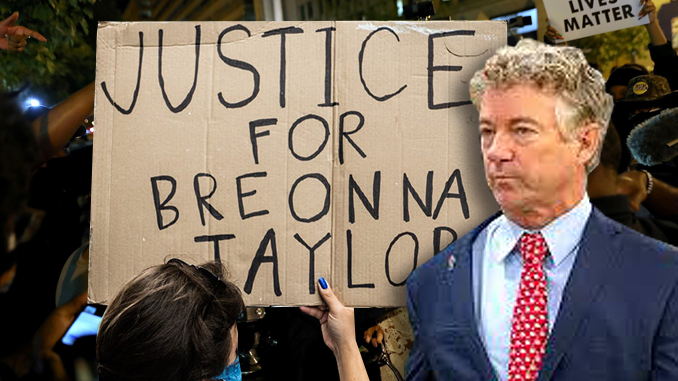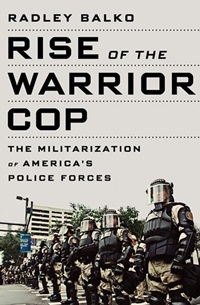
Sen. Rand Paul attacked by mob in D.C. even though he is the sponsor of “no-knock” reform.
By Mark Anderson
Blank minds think alike; they do not think at all. How else to describe the recent baseless heckling and physical attack on Sen. Rand Paul and his wife, Kelley, by clueless leftist agitators? Thankfully, the attack on the Kentucky Republican as he left the White House grounds, just after hearing President Donald Trump’s Aug. 27 acceptance speech at the 2020 virtual GOP convention, did not result in any injuries, due to police protection. Sen. Paul later told Fox News, however, that he still feared for everyone’s safety and felt he and his wife conceivably could have been killed.
Yet, as if the protesters’ aimless aggression wasn’t idiotic enough, they repeatedly shouted at Paul: “Say her name,” referring to Breonna Taylor, a woman tragically killed by police during a March 13 no-knock raid on her Louisville, Ky. home in the middle of the night.
“Taylor is an unambiguous victim of police violence and of unnecessary Drug War tactics,” Libertarian-minded Reason magazine opined. “Paul, though, has done much more than just saying Taylor’s name: He sponsored the Justice for Breonna Taylor Act, which would prohibit no-knock raids.”
Thus, the protestors threatened the very person who actually took action to do something about what happened to Ms. Taylor—something with lasting value to protect the lives and rights of all Americans, since all lives matter.
DETAILS OF THE ACT
According to GovTrack.us, 26-year-old emergency room technician Breonna Taylor was at home after midnight on March 13, when Louisville police entered her apartment unannounced.
“Police were looking for a suspected drug dealer who was using Taylor’s address to receive packages that law enforcement believed contained drugs,” the website explained. “The suspected drug dealer wasn’t at Taylor’s home, though he was arrested elsewhere later that same day. Police had obtained a so-called ‘no-knock warrant’ from local judge Mary Shaw, though it’s unclear whether police in fact knocked or announced their presence in some form before entering. The police claim they knocked; Taylor’s family claims they didn’t. Either way . . . police entered her home, her boyfriend Kenneth Walker grabbed a gun for which he had a permit and fired, police returned fire, and Taylor died after getting shot at least eight times. (Walker survived).”
Sen. Paul introduced this legislation on June 11 as S. 3955. It would ban no-knock warrants on a nationwide level. Oregon and Florida are the only two states that ban no-knock warrants statewide, though more states are considering it, as the topic has garnered headlines. Several cities—including Louisville and Houston—recently banned the practice.
Supporters maintain that no-knock warrants are morally wrong, violate privacy, and too often have been misused, leading to the death of innocent people. “After talking with Breonna Taylor’s family, I’ve come to the conclusion that it’s long past time to get rid of no-knock warrants,” Sen. Paul said in a press release. “This bill will effectively end no-knock raids in the United States.”
 “No one should lose their life in pursuit of a crime without a victim, and ‘no-knock’ warrants should be forbidden,” Sen. Paul added to the Louisville Courier-Journal. “Let’s hope the investigation provides justice.”
“No one should lose their life in pursuit of a crime without a victim, and ‘no-knock’ warrants should be forbidden,” Sen. Paul added to the Louisville Courier-Journal. “Let’s hope the investigation provides justice.”
Opponents of Paul’s bill counter that no-knock warrants should be used sparingly, but they are still sometimes needed because in certain circumstances they can be a valuable option for police departments. “No-knock warrants do have a place in an agency’s toolkit, but you have to know when and how to best apply them,” National Tactical Officers Association Executive Director Thor Eells told NBC News. “And the manner in which that is done is usually through good training and having good policies and procedures in place. . . .”
“Even if probable cause exists for the arrest of a person within, the Fourth Amendment is violated by an unannounced police intrusion into a private home, with or without an arrest warrant,” said the U.S. Supreme Court’s unanimous opinion written by Justice Tom C. Clark, in regarding the 1963 case Ker vs. California. However, the court granted three exceptions, one of which was “where those within, made aware of the presence of someone outside (because, for example, there has been a knock at the door), are then engaged in activity which justifies the officers in the belief that an escape or the destruction of evidence is being attempted.”
As of this writing, S. 3955 awaits a potential vote in the Senate Judiciary Committee. It had two co-sponsors, Sens. Mike Braun (R-Ind.) and Steve Daines (R-Mont.) at press time. All views taken into account, the bill deserves considerably more support and debate. Since a warrant is essentially official permission to enter and search private premises, doesn’t the notion of forcibly entering the domicile unannounced, without so much as a knock, nullify the very idea that police need to exercise due process, as embodied by the very idea of presenting a warrant, and indicate to the home or business owner(s) that they’re on the premises in order to enter? Isn’t a tap on the door, just seconds before entry, the least police can do? Potential escapees could be caught simply by having the premises surrounded when circumstances justify it, though there is the chance that evidence could be quite literally flushed down the toilet.
Readers may want to call Capitol Hill’s congressional switchboard at 202-224-3121 or 225-3121 to register their opinion.
Mark Anderson is AFP’s roving editor. Email him at [email protected].





